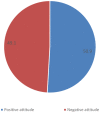COVID-19 vaccine uptake among physicians during the second wave of COVID-19 pandemic: Attitude, intentions, and determinants: A cross-sectional study
- PMID: 35991027
- PMCID: PMC9381988
- DOI: 10.3389/fpubh.2022.823217
COVID-19 vaccine uptake among physicians during the second wave of COVID-19 pandemic: Attitude, intentions, and determinants: A cross-sectional study
Abstract
Background: Developed within a short period of time, the COVID-19 vaccine is not yet widely accepted among the public despite its availability, including by physicians, who are considered a vulnerable group.
Methodology: A descriptive cross-sectional study selected 436 governmental physicians from different specializations, representing four random administrative regions in Egypt. The data were collected through a self-administrated online questionnaire and analyzed using suitable tests.
Results: Out of the studied 436 physicians, 229 (52.2%) [aged 20-30, 284 (65.1%)] were women, 270 (61.9%) were residents, 219 (50.2%) were married, 398 (91.3%) were non-smokers, and 263 (60.3%) were non-frontline caregivers. The majority of the physicians, 227 (52.1%) of them, hesitated to take the vaccine, 236 (54.1%) had not decided on the preferred type of vaccine, and 101 (23.2%) were neutrally confident in the Egyptian healthcare system; 302 (96.3%) had no history of drug or food hypersensitivity. There was no statistically significant (p < 0.05) relationship between the physicians' attitude toward COVID-19 vaccine uptake and the studied demographic variables. There was a statistically significant connection between all of the doctors' intentions to get the COVID-19 vaccine and all of the four attitude domains that were looked at.
Conclusion: The study concluded that a low level of willingness among Egyptian physicians to take the COVID-19 vaccine is a prevalent problem. COVID-19 vaccination hesitancy and non-acceptance were linked to negative attitudes about natural immunity, mistrust of vaccine benefits, and concerns about commercial profiteering.
Keywords: COVID-19; COVID-19 Vaccination; attitude - intentions; cross sectional analysis; physician; vaccination.
Copyright © 2022 Amer, Shah, Abd-Ellatif and El Maghawry.
Conflict of interest statement
The authors declare that the research was conducted in the absence of any commercial or financial relationships that could be construed as a potential conflict of interest.
Figures


Similar articles
-
Attitudes and intentions towards COVID-19 vaccines and associated factors among Egyptian adults.J Infect Public Health. 2021 Oct;14(10):1481-1488. doi: 10.1016/j.jiph.2021.06.019. Epub 2021 Jul 3. J Infect Public Health. 2021. PMID: 34247946 Free PMC article.
-
Beliefs, barriers and hesitancy towards the COVID-19 vaccine among Bangladeshi residents: Findings from a cross-sectional study.PLoS One. 2022 Aug 23;17(8):e0269944. doi: 10.1371/journal.pone.0269944. eCollection 2022. PLoS One. 2022. PMID: 35998135 Free PMC article.
-
COVID-19 vaccination intention and hesitancy: Mistrust on COVID-19 vaccine benefit a major driver for vaccine hesitancy among healthcare workers; a cross-sectional study in North India.J Prev Med Hyg. 2022 Jul 31;63(2):E219-E230. doi: 10.15167/2421-4248/jpmh2022.63.2.1952. eCollection 2022 Jun. J Prev Med Hyg. 2022. PMID: 35968070 Free PMC article.
-
Knowledge about, attitude and acceptance towards, and predictors of intention to receive the COVID-19 vaccine among cancer patients in Eastern China: A cross-sectional survey.J Integr Med. 2022 Jan;20(1):34-44. doi: 10.1016/j.joim.2021.10.004. Epub 2021 Oct 26. J Integr Med. 2022. PMID: 34774463 Free PMC article. Review.
-
A large cross-sectional survey of COVID-19 vaccination willingness amongst healthcare students and professionals: Reveals generational patterns.J Adv Nurs. 2022 Sep;78(9):2894-2903. doi: 10.1111/jan.15222. Epub 2022 Mar 17. J Adv Nurs. 2022. PMID: 35301774 Free PMC article. Review.
Cited by
-
Exploring the reported adverse effects of COVID-19 vaccines among vaccinated Arab populations: a multi-national survey study.Sci Rep. 2024 Feb 27;14(1):4785. doi: 10.1038/s41598-024-54886-0. Sci Rep. 2024. PMID: 38413637 Free PMC article.
-
Fear of COVID-19, Stress and Coping Strategies among Nurses during the COVID-19 Pandemic's Second Wave: A Quasi-Intervention Study.Clin Pract Epidemiol Ment Health. 2023 Dec 21;19:e174501792212200. doi: 10.2174/18740179-v18-e221221-2022-2. eCollection 2023. Clin Pract Epidemiol Ment Health. 2023. PMID: 38130816 Free PMC article.
-
Short-term side effects of BNT162b2 vaccine in primary care settings in Qatar: a retrospective study.Front Public Health. 2024 Apr 10;12:1384327. doi: 10.3389/fpubh.2024.1384327. eCollection 2024. Front Public Health. 2024. PMID: 38660363 Free PMC article.
-
The Effect of Implementing Advanced Strategies to Improve Immunization Coverage in the Elogbele Health Area.Cureus. 2025 Jun 4;17(6):e85346. doi: 10.7759/cureus.85346. eCollection 2025 Jun. Cureus. 2025. PMID: 40621338 Free PMC article.
-
COVID-19 vaccination hesitance and adverse effects among US adults: a longitudinal cohort study.Front Epidemiol. 2024 Jul 16;4:1365090. doi: 10.3389/fepid.2024.1365090. eCollection 2024. Front Epidemiol. 2024. PMID: 39081839 Free PMC article.
References
-
- World Health Organization . COVID-19 Dashboard. who.int. (2021). Available online at: https://covid19.who.int/ (accessed February 6, 2021).
-
- Godlee F. What should we do about vaccine hesitancy? BMJ. (2019) 365:l40–4. 10.1136/bmj.l4044 - DOI
MeSH terms
Substances
LinkOut - more resources
Full Text Sources
Medical

